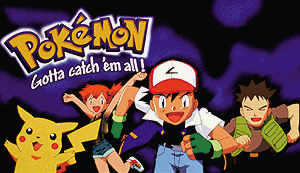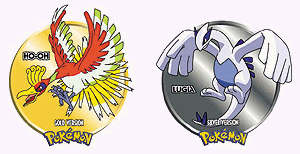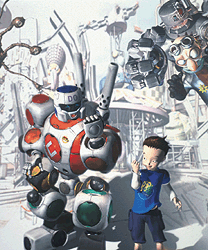Brett Rogers goes behind the scenes to discover the group that brought us Pokon and has recently been called the fastest-growing company in America.

It's an anniversary many parents would like to forget: two years ago last month, the wallets of North America collectively opened to welcome the arrival of 151 pocket monsters to our shores. Since then, Pokémon has grown from what most people outside of Japan knew only as a strange, seizure-causing curiosity into a multi-billion dollar juggernaut. Seemingly, every aspect of American life from Eggo waffles to Radio City Music Hall has capitulated to the power of the Pokémon franchise. How did this happen? Who deserves the credit (or blame)? Meet 4Kids Entertainment, the fastest-growing company in America, according to Fortune magazine. Once a company known only as a money-losing licensing agent and production company whose properties included Mr. Men and Monster Wars, 4Kids has successfully turned Pokémon into an international craze.

A New Beginning
In 1997, Alfred Kahn, Chairman and CEO of 4Kids Entertainment, promised his company's shareholders that he would boost the company's flagging licensing business by concentrating on fewer properties with higher potential and longer life spans. With an eye on that goal, the company inked a deal with Nintendo that year to become the exclusive licensing agent for Nintendo-owned properties (including Pokémon) in all territories outside of Asia. As head of marketing for Coleco in the early 1980s, Kahn was the mastermind behind the Cabbage Patch Kids phenomenon that caused riots in toy stores across the country. Now at the helm of 4Kids, Kahn was ready to stage a repeat performance with Pokémon.
This small, New York City-based company is actually several companies in one: Leisure Concepts is 4Kids' full-service licensing agency, which serves as a go-between for trademark owners like Nintendo, and companies that license characters for consumer products like clothing and toys. This division is largely responsible for the explosive proliferation of Pokémon products, signing over 500 licensees like Topps, Wizards of the Coast and Hasbro to lucrative deals.
Summit Media Group handles 4Kids' media buying and program distribution services, placing advertisements for toy companies on television networks airing children's shows. Summit handles syndication of the Pokémon television show.
4Kids Productions is the group's television, film, music, theatrical and home video production company, which has adapted the Pokémon and Pokémon: The Johto Journeys television shows, Pokémon the First Movie: Mewtwo Strikes Back and Pokémon: The Movie 2000 to audiences outside of Japan. A third Pokémon movie is scheduled for North American theaters in 2001.

4Kids' performance as agent for Nintendo has been lucrative, to say the least. In return for planning and executing the marketing campaigns that ensure Pokémon remains at the top of animated programming and a profitable product for licensees, 4Kids gets a cut of Nintendo's licensing fees. While 4Kids has never publicly disclosed what its royalties are, estimates place the number at about three percent of Pokémon's wholesale sales outside of Asia.
Despite headlines that decry Pokémon as a fad that is plummeting from the peak of its popularity, Pokémon continues to accelerate, defying non-believers. Love it or hate it, Pokémon is actually getting bigger. NPD Group Toy Services Firm, a research firm with relationships with 60% of retailers in the United States, says that Pokémon is "as strong as ever," and that the Gold and Silver video games will increase the franchise's momentum.
Over $3 billion in Pokémon-related sales are expected this year, double Pokémon's first 12 months of sales. 4Kids' net revenue for the first half of 2000 was over $44 million, a 403% increase over the first half of 1999. 4Kids signed 159 new Pokémon licensees during April, May and June 2000 alone, with everyone from Toy Biz to H.J. Heinz of Australia forking over millions of dollars for the privilege of placing the visage of Pikachu or Charmander on their products.
In one area where Pokémon sales slipped, 4Kids still managed to find a way to profit. While Nintendo's Pokémon Yellow and Pokémon Trading Card game titles dropped to the number two and three video game titles in the U.S. for much of 2000, the number one spot was claimed by Perfect Dark, also a property represented for merchandise licensing by 4Kids Entertainment.

A Rolling FranchisePokémon is expected to repeat as the top entertainment franchise for the 2000 holiday season, as the Pokémon Gold and Silver video games debut in the US on October 16, followed by Pokémon Puzzle League and Hey You, Pikachu!, the first voice recognition game for N64, at year's end. In anticipation, FAO Schwarz will launch a "Pokémon Boutique" in its Fifth Avenue store, following in the footsteps of toy stalwarts Barbie and Star Wars. And just when you thought the live arts were safe, a Pokémon stage show produced with Radio City Entertainment made its debut in September at Radio City Music Hall, with a planned 30-city North American tour to follow.
In addition to Pokémon, which continues to receive extremely high ratings, Kids' WB! will air the highly anticipated Pokémon: The Johto Journeys starting October 14, featuring 100 new Pokémon characters from the Gold and Silver video games.
While weary adults may groan at the thought of a continued Pokémon onslaught in North America, let us not forget that Pokémon is only two years old in Europe, where according to Kahn, 4Kids is "seeing excellent results...as the Pokémon phenomenon continues to gain momentum."

Company Chief Financial Officer Joseph Garrity expects 4Kids' performance to be even better in the third and fourth quarters of this year as the Pokémon: The First Movie debuts overseas and sales of Poké-merchandise in Europe could top $300 million.
All this may sound like great news to a company like 4Kids, but it has been a battle for Kahn and company to fight gaining a reputation as a one-trick pony. For 4Kids, it's all about maintaining momentum. Children's tastes are inherently difficult to predict, making sustaining good growth year after year a tall order. As a publicly traded company (NASDAQ: KIDE), 4Kids is under a great deal of pressure to continue to perform.
James, a trader in 4Kids stock who wishes to remain anonymous, observes, "Almost ninety percent of 4Kids' income is derived from Pokémon. The only way they can increase their stock price is to convince investors that there's more to the story. Is it all smoke and mirrors? Is all the good news already out there? Pokémon has been a blessing for them, but if they don't find other viable properties their stockholders will bury them."
Time to Diversify
Kahn insists that Pokémon will remain a profitable property for years to come, but acknowledges that 4Kids needs to expand. "What [Pokémon] has allowed 4Kids to do is to have a springboard into the whole area of children's entertainment. This is a business of ideas. We are spending all of our energies developing new content and different ways of intensifying our return on that content. Corporations want to get customers young and obviously to do that you need kids licensing which is where we think we're at the forefront."
One property 4Kids has acquired as a result of its success with Pokémon is a European licensing agreement with Marvel Enterprises to develop new opportunities for several of Marvel's superhero franchises, including X-Men classic, Spider-Man classic, The Fantastic Four, Silver Surfer, The Incredible Hulk, Avengers, Captain America, Iron Man and Daredevil.


 X-Men. & © 1996 Saban. All Rights Reserved. Fantastic Four.
X-Men. & © 1996 Saban. All Rights Reserved. Fantastic Four.
Iron Man.
In a release describing the new deal, Peter Cuneo, CEO of Marvel Enterprises, says, "4Kids' Leisure Concepts is one of the world's premiere licensing agents, as evidenced by their success with Pokémon and the WCW. Furthermore, 4Kids understands our business and has already proven to be a great partner to our toy company, Toy Biz, who is currently a Pokémon licensee. Leisure Concepts has the manpower and resources to help us immediately build a powerful international presence for our superhero brands."
Kahn has also returned to his roots, with the signing of Cabbage Patch Kids to an exclusive licensing agreement. 4Kids will renew the popular doll franchise and export it using the same patterns that took hold of the United States in the early 1980s. 4Kids will also re-launch characters from its WCW wrestling property, which recently has fallen far short of its main competitor, the World Wrestling Federation. Additionally, in a move that will surely please Thundercats fans, 4Kids has acquired the show's merchandising license and will develop "a whole slew of new [Thundercats] properties and ideas."
Capitalizing on its expertise in marketing video game merchandise, 4Kids has signed Perfect Dark, a top-selling video game from Rare Limited to an agreement to represent that property's merchandising rights. According to Kahn, 4Kids is in negotiations on a new Perfect Dark television series and has had "a lot of interest" from movie studios on Perfect Dark.
While the role of animation in Perfect Dark properties remains to be seen, in a move that may change the face of American animation, 4Kids will look to Japan to supply new exports to the US and Europe. Kahn calls the Japanese the world's "preeminent suppliers of children's entertainment," and he intends to exploit successful Japanese shows beyond Pokémon.

4Kids is using its Pokémon profits to enter the game of internationalizing children's entertainment. The belief that good products can be developed or retooled and updated for children across national boundaries is driving 4Kids to find shows with a successful pedigree and introduce them into new marketplaces.
4Kids has purchased the rights to Tama and Friends, a show with over two decades of popularity in Japan and previewed the "completely re-imagined" series at the company's annual stockholder meeting in May. The show's simple, cute character designs seem to be a perfect follow-up to Pokémon for a younger audience. "The demand for [Tama and Friends] has been exciting, and we want to treat it with the kind of respect it deserves so we are delaying production until September of 2001."
Expect to see other Japanese animation programs on North American television, as well, says Kahn. "We are looking at all the most wonderful Japanese concepts that have been successful over time in Japan and we are very close to a number of [agreements] on those. These are some of the most exciting and successful properties in the history of Japanese animation."
At press time, the identities of the new anime properties are still confidential while contract negotiations continue.
In an attempt to produce some of its own properties, 4Kids Productions is collaborating with Korean partner Daiwon to produce 26 episodes of Cubix, a new CGI series set to debut on the Kids' WB! mid-season schedule. Anticipation is high for this show, which features animation quality that Kahn describes as "equal to Toy Story."

The show takes place in Bubble Town, 2040, where robots are ubiquitous. Everyone on Earth owns a robot, which can be programmed to be good or evil, according to the tendencies of its human master. A boy named Bobby discovers Cubix, a one-of-a-kind prototype in a junkyard and the two become fast friends. What makes Cubix unique is that aliens have hidden a special energy force inside of him, giving him extraordinary powers. The show will feature two running, intertwining plot devices: Bobby and Cubix battling the show's villains, Dr. K and Charles IV, and the aliens' quest to reclaim their lost power supply inside of Cubix. Kahn says that 4Kids is "hopeful that Cubix can be a very, very exciting and very, very profitable show and license."
Donna Friedman, Senior Vice President of Kids' WB!, says, "Cubix is a big idea that has big possibilities. Its distinctive CGI look combined with the network's core ingredients of high adventure, humor and heart make it a perfect fit for Kids' WB!"
The Cubix segment presented at the 4Kids annual shareholders meeting was impressive, featuring engaging animation, plenty of anime-style mecha and a techno soundtrack. After the presentation, Kahn declared the company's intention to launch Cubix in Japan to "hit them with their own strategy."
 Pokémon continues to stand strong,expanding into new territories. © 2000 Warner Bros. All Rights Reserved. Permission is hereby granted to reproduce this photograph for publicity, promotion or advetising connected with the program depicted herein and for no other purpose.
Pokémon continues to stand strong,expanding into new territories. © 2000 Warner Bros. All Rights Reserved. Permission is hereby granted to reproduce this photograph for publicity, promotion or advetising connected with the program depicted herein and for no other purpose.
A Volatile Problem
While Pokémon remains hot and the strategy moving forward seems sound, not everything is rosy at 4Kids. The excitement over Pokémon sent the company's stock soaring to over $93 a share in November 1999, from less than $2 only a year earlier. The panic buying that boosted the stock gave the company increased notoriety, but it also set shareholders up for a crushing downfall. Since November 1999, shares of 4Kids have plummeted to about $20 per share, a 78% decline in price and an $876 million decline in the company's market capitalization. Short sellers, traders who sell stock they don't own in an effort to buy it at a lower price and profit from the decline, have targeted 4Kids in droves, believing that when Pokémon slows, the company's prospects will dry up. Kahn, the largest holder of 4Kids stock is open about his disappointment in the stock price's recent stagnation. Says Kahn, "My one disappointment is the decline in our share price notwithstanding our outstanding financial results."
At the annual meeting, Kahn allowed his anger to show over losing an estimated $70 million in personal net worth as 4Kids' stock price declined from its highs, lashing out at whom he described as "professional short-sellers" targeting 4Kids' stock and calling the company's shares a "screaming buy."
The future for 4Kids looks bright, but its volatile stock is a nagging concern for the company. However, the creation of two new 4Kids divisions, Technology4Kids, which creates electronic children's products and Websites4Kids, a developer of Internet entertainment sites such as girlsgymnastics.com, seem to further indicate that efforts to diversify away from Pokémon dependence are progressing.
Animation will never be the same, thanks to 4Kids and its efforts with Pokémon. There have been Japanese imports airing on American television since the 1960s, but Pokémon has opened the world's eyes to Japanese animation in ways never conceived. If 4Kids is correct in predicting that large corporations of the 21st century will increasingly rely on licensing children's entertainment to attract future customers, we will be witness to a changing landscape for animation, a globalization that reshapes the relationships between development, production, licensing and media placement. Lauded as a profit machine or vilified as poisonous to a competitive, creative, entertainment market, the Pokémon model for children's animation might be here to stay.
Brett Rogers is a freelance writer and law student based in Baltimore.







